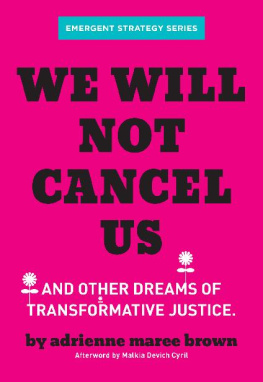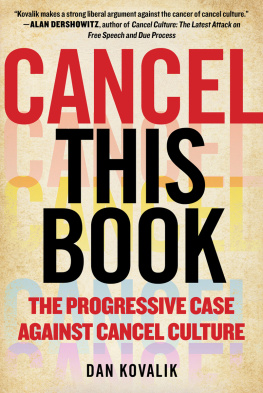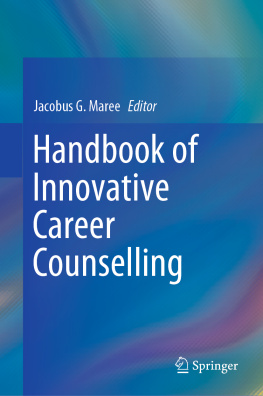We Will Not Cancel Us
And Other Dreams of Transformative Justice
adrienne maree brown
Afterword by Malkia Devich Cyril
emergent strategy series
Introduction
Building Abolitionist Movements
Abolition is about presence, not absence. Its about building life-affirming institutions.
Ruth Wilson Gilmore
Abolitionists know that the implications of our visions touch everythingeverything must change, including us. In order to generate a future in which we all know we can belong, be human, and be held, we must build life-affirming institutions, including our movements.
This booklet, centered around an edited version of my July 2020 blog post Unthinkable Thoughts: Call Out Culture in the Age of Covid-19 , has emerged slowly, piece by piece, as I have felt a punitive tendency root and flourish within our movements. I have felt us losing our capacity to distinguish between comrade and opponent, losing our capacity to generate belonging. I share this writing with the intention of intervention and invitation.
I am reminded of the pamphlets and booklets that my teacher Grace Lee Boggs published, specific pieces of writing that she wanted people to hold in their hands and use to spark their own conversations, reckon with their relationship to the revolutionary content within. That is also my intention herethere are quite possibly more questions than answers in here, but these are conversations I hope we are all having with our own political home communities.
Every piece of writing in this book changed me in the writing of it, and scared me when I wrote it. Each of these pieces bubbled up, woke me up in the dark, tried slipping unsubtly into other writing efforts, wanted to be written. I tried to avoid being the person to write each oneI dont know all the answers. I hold space for movement growth, and every time humans are present, so is conflict, and all manner of harmful human behavior.
You are able to read these thoughts because it is my fractal responsibility to be honest about what I am seeing and feeling as patterns within our shared work. I am a tiny cell within multiple movement bodies for justice and abolition. This booklet is a bid for our movements to attend to the spiritual work of abolition in ourselves, in our movements, in the world. Emergent strategy suggests that we must work hard at getting abolitionist practice functional at a small scale so that large-scale abolition and transformative justice are more visible, rootable, possible.
We are seeding the future, including our next systems of justice, with every action we take; the fractal nature of our sacred design teaches us that our smallest choices today will become our next norms. I am concerned with what that looks like with conflict resolution and accountability within movement.
Who is the I, the We?
It always feels important to me to reveal who I am as the author of these ideas, and the lineage I draw upon.
I am a Black biracial queer fat survivor, witch, movement facilitator, and mediator. I am a student of complexity. I am learning complexity from the inside out. I am a student of change and a student of how groups change togetherchange themselves and change the world.
I have spent most of my political life honing the skill of neutrality. This doesnt mean my politics have ever been neutral, but that I have often held my thoughts and opinions to myself, ceding the realm of content to the communities I serve.
Because I am discerning about who I will work for, I am rarely out of alignment with the communities I serve. I have chosen to hold people whose work, and whose politics, I believe inprimarily Black and Brown organizers fighting for social and environmental justice, specifically those who are openly anti-capitalist, feminist, Indigenous and/or following Indigenous leadership, and abolitionist. I have supported them to hash out the distinctions, positions, disagreements, and misalignments, to find their own solidarities, and be able to step forward together towards a future we are co-creating.
There are many things I do not know, am not expert in. I try not to write, speak, or be seen as a teacher in those things. Part of what happens when you become more well known is that people begin to ask you about things you dont know, expect you to know everything And in this age of 24/7 punditry, there are a lot of generalists who take up space with what they dont know, or only know a little bit about. That brief, surface-level expertise is a pet peeve of mineId rather know what I know and point to others who know what I dont know.
I have studied the work of Sojourner Truth, Angela Y. Davis, Ruth Wilson Gilmore, Mariame Kaba, Mimi Kim, Rachel Herzing, Ron Scott, Walidah Imarisha, Shira Hassan, Ejeris Dixon, Leah Lakshmi Piepzna-Samarasinha, Mia Mingus, Mark-Anthony Johnson, Andrea Ritchie, Patrisse Cullors, and Prentis Hemphill, among others. Much of their work has spoken of the carceral state as it relates to sexual, physical, domestic, and other commons arenas of abuse and harm. They have helped me understand the omnipresence of punitive justicefrom the corporal punishment of children at home and school, to suspension, expulsion, juvenile detention in educational systems, to the imprisonment and execution of adults. They helped me see the ways that our current justice system roots into slavery: lynchings, whipping, chains, bars, police, snitches, and, in some ways the most violent punishment for an interconnected species, the removal of humans from community.
These teachers also helped me see the limitations of restorative justicethat it often meant restoring conditions that were fundamentally harmful and unequal, unjust. If the racialized system of capitalism has produced such inequality that someone is hungry and steals a purse to resource a meal, returning the purse with an apology or community service does nothing to address that hunger. These teachers brought me to transformative justice, the work of addressing harm at the root, outside the mechanisms of the state, so that we can grow into right relationship with each other.
Another dynamic occurs when people begin to see you as a teacheryou have to be more careful with your questions, with your emotional explorationsthey might emerge from you as inquiry and land with another as gospel. The tricky bit here is that some of what I know best are questionsthe questions a group needs to reckon with. Identifying and asking the questions doesnt mean I know the answers. In my emotional inquiries, it usually means I feel lost, and longing for a clarity that aligns with my vision of transformation from a rigid, punitive, disconnected society to an adaptive, resilient, and interdependent one.
With each of the pieces in this collection, my goal is to bring transformative justice to life within our movement spacesnot as a futurist theory we are demanding from the larger world, but as a practice we are rigorously in with each other as believers, growing the capacity to invite others into.
I honor all our different attempts at learning to do justice ourselves.
I respect and learn from righteous anger, my own and others.
I want to punish people too sometimes, especially those whom I have survived. Im not above it.
I dont want to protect those who cause harm, or limit the options of survivors. I want healing for all.
I want to bring our attention to patterns that echo and generate harm for survivors and harm doers.
I want to bring our attention to what generates healing for those survivors who receive and those who cause harmand the majority, who do both.






